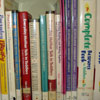 Here’s an interesting Newsday story I spotted on LISNews, called “Books for Dessert,” about a program of the same name at the Port Washington (NY) Public Library on Long Island. It’s a book club for developmentally disabled adults started by the mother of one of the young men in the group. After Jamie Comer graduated from high school at 21- he’s now 29 – she noticed that he was gradually losing his cognitive abilities:
Here’s an interesting Newsday story I spotted on LISNews, called “Books for Dessert,” about a program of the same name at the Port Washington (NY) Public Library on Long Island. It’s a book club for developmentally disabled adults started by the mother of one of the young men in the group. After Jamie Comer graduated from high school at 21- he’s now 29 – she noticed that he was gradually losing his cognitive abilities:
As Comer, who has Down syndrome, began to gradually lose critical thinking skills without the aid of vigorous schoolwork, his mother struggled to find opportunities to keep him mentally sharp.
“People have always assumed that people like Jamie don’t really have opinions on anything remotely complex,” said his mother, Nancy Comer, 64, of Port Washington. “They’re just expected to work and be happy.”
Read the story to see how the group, run by the parent/advocates from the community with instructors they hire, gets the adults, some of whom are in group homes and are of varying intellectual abilities, to participate and discuss the books. Many of them have very low reading levels, but the group works through the stories bit by bit, each participating to his or her ability.
But the thing I enjoyed in particular about this article was that nowhere was the term “children’s librarian” or “children’s department” mentioned. Over the years, I’ve often seen the children’s librarian called upon when developmentally disabled adults are brought into the library, and the adults working with them browsing the children’s materials.
True, the group did read Harry Potter and the Sorcerer’s Stone, but they also read Around the World in 80 Days and other classics, and emphasis appears to be on treating the participants as the adults they are.